|
|
|
Sort Order |
|
|
|
Items / Page
|
|
|
|
|
|
|
| Srl | Item |
| 1 |
ID:
181531
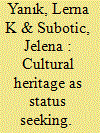

|
|
|
|
|
| Summary/Abstract |
This article explores the relationship between cultural heritage politics and international status-seeking. We advance a two-fold typology of status-seeking that explains why states engage in cultural heritage restoration practices at home and abroad. First, cultural heritage restoration can be an easy way to signal state respect of its multicultural past while providing cover for continuing anti-multicultural policies of the present. States with uncertain, challenged, or liminal international status use cultural heritage projects as a ‘standard of civilization’ of democracy, displaying themselves on the international stage as worthy of status and respect. Cultural heritage here is used as a strategy for international status affirmation. Second, states may engage in cultural heritage restoration beyond their borders, supporting or directly managing renovation of these sites in order to expand their imagined national cultural, political, and economic domain. Cultural heritage restoration projects here serve as a backdrop for powerful international economic alliances that can be used for status substitution—replacing one status-generating benchmark of ‘standard of civilization’ with another—economic prosperity. We illustrate these arguments with two recent cases of cultural heritage restoration that involve Turkey: the ‘Akdamar’ Church in Van, Turkey and the Tomb of Gül Baba in Budapest, Hungary.
|
|
|
|
|
|
|
|
|
|
|
|
|
|
|
|
| 2 |
ID:
114240
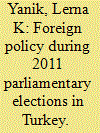

|
|
|
|
|
| Publication |
2012.
|
| Summary/Abstract |
This article focuses on the foreign policy sections of 2011 election manifestos of the Adalet ve Kalkinma Partisi (Justice and Development Party) (AKP), the Cumhuriyet Halk Partisi (Republican People's Party) (CHP), the Milliyetçi Hareket Partisi (Nationalist Movement Party) MHP, and the Emek, Demokrasi ve Özgürlük Bloku (Labor, Democracy and Freedom Bloc) (EDÖB) the pre-election Bars ve Demokrasi Partisi (Peace and Democracy Party) (BDP). Foreign policy is both an issue and a non-issue for Turkish electorate because although foreign policy issues have almost no impact on voters choices, the parties still continue to devote space to foreign policy performances, promises, and projections in their election manifestos. The analysis of 2011 election manifestos reveals that the AKP primarily envisions a Turkey with more commonalities with the East than with the West, but yet ranked Turkey's relations with Europe and the West higher; for the MHP while Turkey's commonality with the East was defined in terms of common history and culture, the West was portrayed to have commonness only in terms of values; the CHP equated European values with universalism and prioritized Turkey's ties with Europe; finally, the EDÖB manifesto was an anti-thesis of all manifestos where foreign policy was instrumental for the ideological goals of the bloc and subsequently of the BDP.
|
|
|
|
|
|
|
|
|
|
|
|
|
|
|
|
| 3 |
ID:
190815
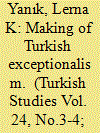

|
|
|
|
|
| Summary/Abstract |
This article has two main goals. The first is to examine the role of politics of space and time in making Turkey’s international relations. The second is to answer a more general question: what happens to a non-Western state like Turkey that cannot eliminate ‘differences’ that mark that state as non-Western? My answer is that these states handle these ‘differences’ that do not entirely disappear by creating exceptionalism. Exceptionalism rebrands ‘difference’ as ‘distinctiveness’ that can only be possessed by a specific country or nation. The article identifies two main pathways to the creation of Turkish exceptionalism, space and time, and explores the brief history of these spatio-temporal imaginations leading to the making of the exceptionalist narrative and their implications for Turkey’s foreign relations and identity.
|
|
|
|
|
|
|
|
|
|
|
|
|
|
|
|
| 4 |
ID:
153742
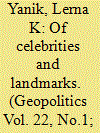

|
|
|
|
|
| Summary/Abstract |
This paper analyses the (re)production of Turkey’s liminal-hybrid representations through a combination of sports and music celebrity interventions on a specific landmark. It shows that a country’s representations can be reinforced and reaffirmed with the help of celebrities performing their talent on landmarks such as the Bosphorus Bridge and (in some cases) placing another landmark – Ortaköy Mosque – in the backdrop. Combined with the role of celebrities, these two landmarks that have come to symbolise Turkey’s liminality and hybridity visually, in a very mundane manner, aim to add a cosmopolitan component, a banal one though, to the national identity. This further shows that national identity is not always made and shaped by the citizens of that country, but rather foreigners can actively contribute to certain elements of an identity. The paper also draws attention to the role of the states in the making of celebrity politics, refocusing the attention from politician celebrity interaction to state and celebrity interaction.
|
|
|
|
|
|
|
|
|
|
|
|
|
|
|
|
| 5 |
ID:
121245
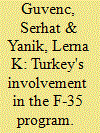

|
|
|
|
|
| Publication |
2013.
|
| Summary/Abstract |
Turkey has been involved in the international consortium that builds the
F-35 Joint Strike Fighter (JSF) since 1999. The relationship between Turkey
and the consortium may appear to be rocky, however, because of Turkey's
many hesitations to commit to the JSF program. In this article we argue that
these hesitations are strategic, designed to extract maximum benefits for
Turkey's defence industry from the consortium manufacturing the fighter
jets. For in addition to wanting to buy these fighter jets, Turkey seeks to
maximize the amount of local work-share to secure access to the software
of the aircraft, and to accumulate enough experience that will eventually
lead to designing and manufacturing a "fully indigenous" combat aircraft.
|
|
|
|
|
|
|
|
|
|
|
|
|
|
|
|
|
|
|
|
|